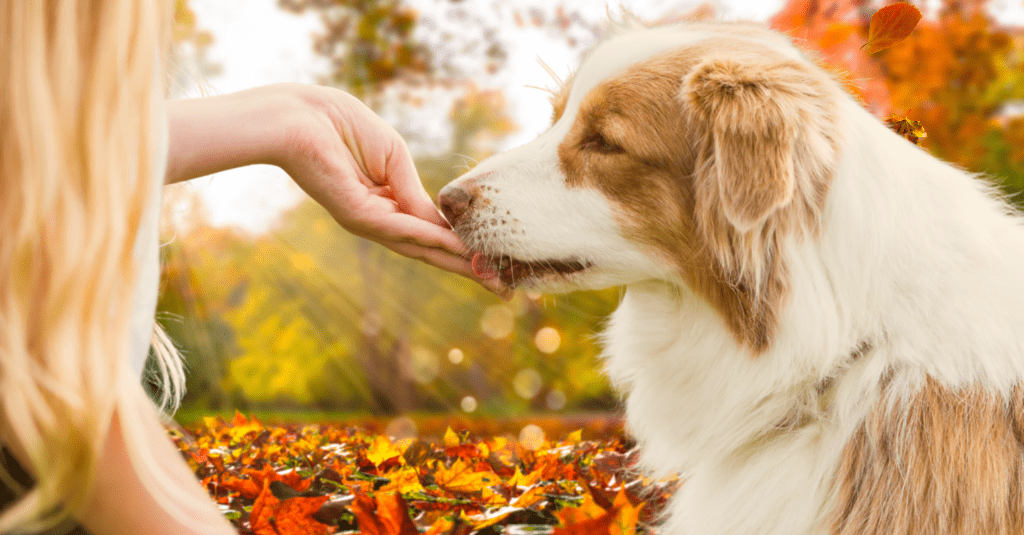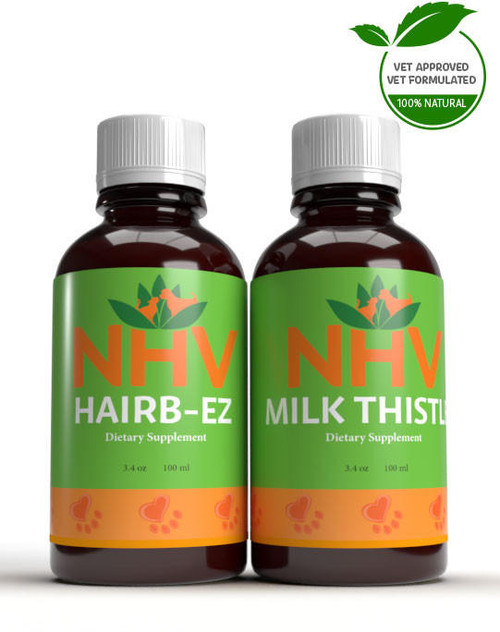- Description
- Ingredients
- Dosage
- FAQ
Description
Hairball Support for all cats
Did you know that your furkiddo spends 30% of their waking life grooming? And because of their natural habit, they tend to swallow a lot of hair! Long haired cat breeds like Main Coons, Persians, and Ragdolls are more likely to develop hairballs than their short-haired meow-sins; however, all cats can get them. If the ingested hair cannot get past your kitty's stomach and small intestine, then a hairball will form. NHV Hairball Control Kit contains Hairb-Ez, which helps to dissolve hair buildup, soothe inflammation along the GI tract and improve the motility of undigested matter, while Milk Thistle helps with detoxification, reducing oxidative stress on the liver, and supporting healthy kidney/gallbladder function.
How NHV Remedies Supports Digestive Health and Hairball Control
The hacking sound of your kitty retching is pretty unpleasant to witness for any pet parent, but hairballs are a side effect of your cat's constant grooming. Suppose your furry friend is throwing up a hairball more than once a month. In that case, there may be something more serious going on like intestinal motility problems, skin issues, abdomen issues, urinary tract problems, or musculoskeletal concerns. When your kitty is grooming, their tongue is barbed (like a miniature brush), moving loose hair down their throat. Typically, this ingested hair passes through their GI tract and into their litter box. Sometimes, however, the hair can get stuck in their stomach, and they throw this up as hairballs. Hairballs become a problem when your kitty's digestive system can't move the hair through the stomach and intestinal tract at an average speed, leading to a possible blockage and issues with other organs. NHV Hairball Control Kit contains Hairb-Ez and Milk Thistle to help support your kitty's digestive health, organ health and to help pass hairballs naturally.
- Can help dissolve ingested hairballs
- Helps with discomfort and nausea
- May help relieve indigestion and malabsorption
- Aid in soothing inflammation and improving peristalsis along GI tract
- Can relieve bowel spasms and help to remove waste from body
- Can support healthy immunity
- Can help support gentle detoxification
- May support liver regeneration and reducing oxidative stress
- Beneficial for healthy kidney/gallbladder function
Hairball Control Kit is a natural healthcare support that aids with dissolving hairballs, improving GI tract health as well as support detoxification and immune function. These liquid supplements with high bioavailability are safe and effective to use alongside other hairball treatments.
At NHV, we are a team of pet experts, vets, and animal lovers. Get in touch with us if you have any questions or concerns about your kitty's unique health concerns.
- item number
- BD5048
- weight
- 1.40 LBS
- volume
- 2 x 3.4 fl. oz (100ml)
- life stages
- adult, senior, puppy/kitten
- form
- liquid
- made in
- Canada
Disclaimer: The information provided in relation to the products mentioned is intended for general informational purposes only and should not be construed as professional veterinary advice or a substitute for consultation with a qualified veterinarian. These products are not intended to diagnose, treat, cure, or prevent any pet health condition. Consult a licensed veterinarian before using any product or making changes to your pet's diet, health, or wellness routine. Individual pet health outcomes may vary, and the effectiveness of the product may depend on various factors specific to your pet. Always carefully read and follow the product label and instructions. The manufacturer and distributor of these products do not assume any liability for any direct or indirect consequences that may arise from the use of these products on pets. All information is for educational purposes only.
Ingredients
Made with the finest, organically grown, or ethically harvested herbs. Made specifically for pets, vet-formulated and vet approved.
Hairb-Ez
- Licorice (Glycyrrhiza glabra)—Has been used for centuries to help soothe tissue damage in the upper GI tract and relieve bloating
- Cascara Sagrada (Frangula purshiana)—Is widely used in veterinary medicine as a gentle laxative to stimulate increased bile flow (which helps purge hairballs)
- Oregon Grape (Mahonia aquifolium)—Contains anti-inflammatory properties that aid with detoxification, indigestion and malabsorption as well as stimulating bile production (helping to eliminate hairballs)
- Ginger (Zingiber officinale)—Is a stimulant that is often used for relieving discomfort, helping with circulation and improving peristalsis and intestinal muscle strength
- Raspberry (Rabus idaeus)—Is beneficial for helping to reduce digestive tract inflammation and diarrhea as well as balancing the laxative effects of the other herbs in this natural remedy
- Lobelia (Lobeloia inflata)—Helps to relax muscles in the respiratory system and relieve bowel spasms
- Chinese Rhubarb (Rheum palmatum)—May improve liver function, bile flow and improve gallbladder function as well as gently detoxify intestines
Milk Thistle
- Milk Thistle—Has been used for centuries to help with digestive disorders, particularly for functional disturbances in the biliary system (liver, gallbladder, bile ducts)
Inactive ingredients such as water, glycerin, or bases for ointments like olive oil are not listed in this ingredient tab. For a full list of ingredients, please see the label picture on the bottle, shown above. Information about ingredients is for educational purposes only. It is important to always refer to the product label for the most accurate and up-to-date information regarding ingredients.
Dosage
Pet's Weight Dosage
To be taken twice daily. All NHV supplements are designed to be used together, and can, therefore, be given at once for convenience.
Select your pet's weight to determine the correct dose.
To be taken twice daily. Determine your pet’s weight and then use the easy chart below to determine the correct dose. This is the minimum dosage.
Pet's Weight Dosage
0 - 15 lb = 0.5 ml
16 - 30 lb = 1.0 ml
31 - 45 lb = 1.5 ml
46 - 60 lb = 2.0 ml
61 - 75 lb = 2.5 ml
Over 75 lb = 3.0 ml
For rabbits: 0.5 ml twice a day
How to Administer
Shake well before use. The easiest method is to use the dropper provided and place the drops into your pet’s food or favorite treat. You can also use the dropper and squirt directly into the pet’s mouth. Some pets can be finicky, if this occurs consider hiding the drops in foods most pet’s love such as fish, chicken or yogurt or a favorite treat. If your pet only eats dry food then soak a few kibbles at feeding time.
For Best Results
Herbal dietary supplements are beneficial to the health and well-being of your pet and are safe for long-term use. Every pet responds to natural herbal supplements differently, therefore it is important to be consistent and administer the product daily. Supplements generally take two to four weeks to take effect, however this will vary from one animal to the next.
Product Storage
All NHV Natural Pet Products are pure herbal extracts and contain no artificial additives, preservatives or coloring. Shelf life after opening is 6 months and must be refrigerated after opening.
Cautions and Contraindications
Do not use in pregnant or nursing animals.
All information provided by NHV Natural Pet Products is for educational purposes only.
FAQ
Is NHV Hairball Control kit safe to use every day?
Yes! All of our supplements are made with organically grown herbs combined with non-GMO vegetable glycerin (and no added colors or preservatives) which is safe for long-term daily use and tastes great too!
I noticed that there is alcohol in the formula. Is it safe?
A very small amount of alcohol is leftover after the extraction process - it is not an added ingredient. The medicinal properties of certain herbs in this recipe are more bioavailable when extracted this way. All of our supplements are vet-formulated and have been used safely on pets for decades. However, any pet parent can use a teaspoon of boiling water in the dosage to evaporate any leftover alcohol.
Do dogs get hairballs?
Yes, but it is much rarer in dogs than in cats because kitties have much more sensitive tummies than doggos. Hairballs in dogs can indicate an underlying issue. Any dog pawrent dealing with hairball issues should book a consultation with their vet to see if there is a skin allergy or parasitic infestation, which can cause more licking and gnawing. If an underlying condition does not seem to be the cause, your vet may recommend some kind of laxative or a temporary change in diet to help your furkiddo pass the excess hair in their tummy.
How do you help your cat pass a hairball?
To help your kitty eliminate hairballs, you could try using a natural hairball remedy like NHV Hairb-Ez (rated 5 paws out of 5). It can help dissolve ingested hairballs (in the stomach) and move undigested matter along the GI tract to pass out of their body naturally.
My cat is throwing up hairballs and bile, what do I do?
Hairballs (technically called “trichobezoars) are a mixture of hair, bile and sometimes undigested food. While an occasional hairball is no cause for immediate concern, if your cat is vomiting up a hairball more than once a month, then there could be something more serious going on. A loss of appetite, possible lethargy and ongoing vomiting, gagging, retching, or hacking without producing a hairball, could be signs that your sweet kitty is suffering from a gastrointestinal blockage requiring emergency surgery. If this is what’s happening, take them to the vet asap!
Why do cats get hairballs?
Normally, cats will swallow hair when grooming - their tongues are like mini brushes that remove loose hair. This ingested hair normally passes through the GI tract into their poop but sometimes the hair gets stuck and can irritate their sensitive bellies so it gets expelled as a hairball. Long-haired kitties like Main Coons, Persians, and Ragdolls are more prone to hairballs than their shorthaired cousins. While an occasional hairball is no cause for alarm, cats that vomit up a hairball more than 1-2 times per month should probably get their vet to do a thorough exam to make sure that there isn’t something more serious going on.
How do I prevent hairballs?
- Brush your kitty. Not all kitties will love this, but it can greatly reduce the frequency of hairballs.
- Try the ‘lion cut'. This cut is when your furkiddo’s hair is shaved down to the skin but a mane of hair is left around the head and ears. It can be a bit shocking for fur parents but many long-haired kitties love it, especially in the summer.
- Add Fiber to their diet. Pumpkin or cilium are great natural sources.
- Try using a natural hairball remedy like our NHV Hairb-Ez. It will help eliminate hairballs and vomiting by dissolving ingested hairballs, reducing constipation caused by hair build up, relieving discomfort, bloating, and discomfort and even supports the liver!



 USD
USD
 Canadian Dollars
Canadian Dollars



